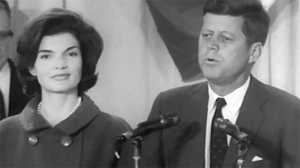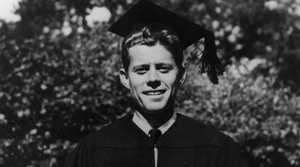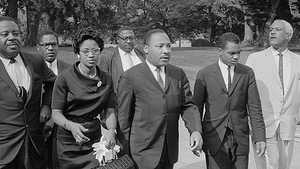JFK: The Legacy

President John Kennedy took office during one of the most turbulent times in American history. The Cold War between democracy and communism was becoming more belligerent, and the United States and the Soviet Union possessed enough nuclear weapons to destroy the world many times over. In American cities, racial tension was rising. Growing numbers of black Americans had begun to demonstrate for equal treatment under the law, and white segregationists promised to deny these rights, using violence if necessary.
From the first moments of his presidency, Kennedy evoked a sense of security and a spirit of idealism which reassured Americans of their nation's strengths and inspired them to serve their country and the world. "And so, my fellow Americans -- ask not what your country can do for you -- ask what you can do for your country. My fellow citizens of the world -- ask not what America will do for you, but what together we can do for the freedom of man," Kennedy said in his inaugural address. Dazzled by his poise, moved by his eloquence, Americans proudly embraced the vigor and vision of their young president.
As he struggled with the complexities of foreign and domestic politics, Kennedy sometimes fell short of his idealistic rhetoric. A self-proclaimed supporter of civil rights, he moved forward slowly on the issue until 1963, when racial violence forced his hand. An advocate of peaceful development abroad, he hastened America's descent into the Vietnam war, a conflict that would end countless lives and bitterly divide the nation.
Kennedy's hard-line international diplomacy helped preserve Western democracy and may have prevented a catastrophic nuclear war, but it also heightened the tension between the superpowers. When Soviet Premier Nikita Khrushchev threatened to take West Berlin in 1961, Kennedy promised a military response, and the Russians backed down. When the Soviets began to install missiles in Cuba in late 1962, Kennedy demanded their removal, then skillfully transacted a diplomatic settlement which kept the two enemies at peace. Later, he negotiated a treaty to end atmospheric nuclear testing, the first nuclear weapons treaty in history.

The popular legend of John F. Kennedy superseded reality; he made a singular, seemingly indelible impression upon the American scene. With his beautiful wife, Jacqueline Bouvier Kennedy, and his adorable children at his side, John Kennedy created an image that later revelations of his moral and physical weaknesses could tarnish, but not destroy. His assassination on November 22, 1963, in Dallas, Texas, marked a bloody conclusion to his presidency, but hastened his coronation as the martyred prince of American politics. In death, he became a cultural icon.
The idealism that Kennedy evoked did not die with him. Although Kennedy failed to realize his promise, he left a legacy of hope to millions of Americans.







